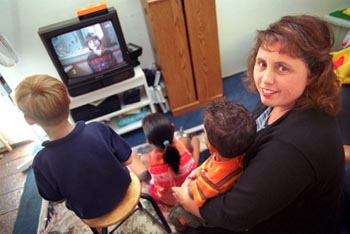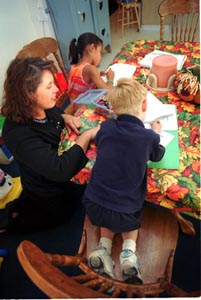![[Metroactive News&Issues]](/gifs/news468.gif)
[ San Jose | Metroactive Central | Archives ]
 Photograph by George Sakkestad No Kidding: Denise Marchy, president of the Foster Parent Association, acknowledges that the shortage of foster parents is reaching crisis proportions. Foster Freeze Foster parents are bailing out of the system left and right because the money offered for raising a foster child can't pay Silicon Valley rents By Dara Colwell AS SITHA RITH FUMBLES with her presentation, frozen onto the projector screen behind her with the words "InFocus.com" emblazoned on its purple background, her audience, spread across the darkened auditorium, waits patiently. Unable to summon the multicolored pie charts, the graphic and statistical breakdowns representing children entering the county's foster care system, Rith finally just grabs a microphone and launches into the morning's business. The group, a collection of a dozen or so well-groomed couples, has come for a 90-minute orientation that attempts to cover the thorny ins and outs of foster care: its dense application process, the rates, requirements and references, and the responsibilities foster parents face as they welcome the children, suffering from a wide range of emotional and behavioral problems, into their homes. As Rith explains the issues with sensible exhaustion, a number of hands raise and questions quickly follow: "How do children get into the system?" "What happens to the birth parents?" "Is the goal of foster care reunification?" The answers, which reveal confusing and bureaucratic policies and explanations, spark further questions. Finally, Rith motions to Denise Marchu, president of the Foster Parent Association and who has cared for more than 100 foster children over the last decade, to take the mic. "You may think working with the system is the hardest part," Marchu, a friendly and matronly woman, says, her voice wavering slightly in front of the crowd. A woman nearby sighs audibly--Marchu seems to have addressed a concern. "But saying goodbye to kids is the hardest." A few days later, in a private conversation away from county social workers, Marchu takes a different tack. "It's tough; the children come from all walks of life, with different types of disabilities. But that's not the hardest part of caring for them," she says. "Dealing with the bureaucracy is." Marchu may come across as inconsistent, but she walks a delicate line--especially because she recognizes the quagmire foster agencies, both government and nonprofit, are in. Across the state, but particularly within Santa Clara County, there is a severe shortage of foster care homes. While the number of children entering the system has risen, the system, which historically has been underfunded, overburdened and riddled with bureaucratic hurdles, has continued to lose its greatest resource--parents. Poorly compensated and poorly paid, burned out and with little support, many foster parents are turning their backs. With years of experience behind her, this is something Marchu understands all too well. "You don't want to totally scare them off," she says of the potential foster parents at the orientation. "But how much do you say? We need all of them. But once they're in," she says soberly, "they're going to need to fight hard for those children." Family Value FOSTER PARENTS, already struggling with little help from the state, are rapidly declining in number. According to Santa Clara County's Department of Social Services, the number of licensed foster homes has dwindled from 800 homes in 1991 to 367 homes this year. The majority of those homes, reserved for children permanently released for adoption, trims that number down to a slim 120--the number currently available for foster placement. "In the past year, we recruited over 100 new foster homes, but that's still no large net gain," says Leroy Martin, director of the county's Family and Children Services. "There's a critical need in this county. We've been looking at this as a crisis waiting to happen." With more than 1,200 children needing foster placements last year and an emergency children's shelter population that hovers near 140, the crisis, it seems, is here. And foster family agencies, once specifically reserved for older children with greater emotional needs, too, are facing the shortage. "I am almost speechless at the lack of foster parents," says Charyanne Hawkins, training coordinator at Future Families in Santa Cruz. "The need for placement is dramatic." Cost of Living SAN JOSE, CALIFORNIA: epicenter of the new world economy, cutting-edge technology and multimillionaires whose salaries consistently hit the headlines. Also home to an incredibly high cost of living, housing and labor shortages, two-income families struggling to put grub on the table and the highest child care costs in California--averaging $577 per month to $925 per month statewide. Is it any wonder why the number of foster parents has dipped dangerously low? "The economics of the situation make it difficult for people to take on this kind of responsibility," says Michelle Swalley, spokesperson for the Department of Social Services. "The amount you get doesn't really cover the full cost of caring for a child." Reimbursement--it's no secret--has remained woefully inadequate for years. Federal funds, which go to the state and might adequately cover expenses in Tennessee or Mississippi, are not sufficient for the cost of living in California. Nationwide, the basic rate for foster care in July 1990 was $345 per month for a preschooler; in 2000, that rate increased to $393 per month. Take, as a comparison, the current rate for child support in California: $800 per month. The payback, especially in the valley, where child support scarcely covers a month's rent, is a joke. In Santa Clara County, the Board of Supervisors decided to give foster parents a $50 subsidy per month, as well as offer liability insurance. But, says, Marchu, "you're never in it for the money; it doesn't pay the rent and it doesn't buy the groceries." Marchu and her husband, who have five children of their own and are in the process of adopting three, typically run short at the end of the month. The rest goes onto credit cards.
Photograph by George Sakkestad
Pound Foolish IN THE BIGGER PICTURE, the lack of foster parents actually adds greatly to the costs faced by the state. According to California's Department of Social Services, the state pays between $405 and $569 per month, depending on the child's age, to place a child in a foster home. When that runs out, the state is forced to opt for group homes, where the state will have to pay $1,353-$5,732 per month, depending on the severity of the child's behavioral problems and needs. Stretched funds ultimately mean less money going into adequate training, monitoring and supervision of parents already within the system. And the consequences of badly trained or badly chosen caregivers who aren't prepared to deal with the intense emotional trauma foster children frequently suffer can be tragic. Such is the case of a Sacramento woman, injured in a car accident, who voluntarily put her own daughter in a foster home. According to the Little Hoover Commission's 1992 report "Restructuring Foster Care in California," during one of the child's tantrums, the foster mother wrapped the child in a blanket and squatted on her until she was quiet. The child suffocated. In the same report, there was the case of a foster mother in Los Angeles, arrested on charges of beating to death her 23-month-old foster son, allegedly over toilet-training problems. Add to this the enormous number of children entering California's foster care system: in 1991, the California Legislative Analyst's office compared the state's placement rate to that of the nation as a whole. The office found California's placement rate was almost double the national average. And what's more, according to a study conducted by California Food Policy Advocates, children placed in foster care tend to perform poorly in school, lagging at least one year behind other children. In the long term, they tend to have both limited education and job skills. "If you don't pay up front," says Gil Villagran, manager of community relations at the Department of Social Services, "you pay in another way." Used Parents 'YOU CAN USE MY NAME," Teri Cosentino, an energetic woman in a purple tie-dye dress, says, as she lights the Kool cigarette clutched between her fingers. "I never plan on fostering through the county again--I've got nothing to lose." Cosentino, with her partner of 19 years, fostered 47 kids over six-and-a-half years through the county's emergency foster care program but she stopped because she felt she had no say where her children were placed long-term. "I had them 24/7; what I had to say should have carried some weight," she says angrily. "This was a home, a family, not an institution. Once they left my home, they didn't stop being mine." Cosentino's concern stemmed from what she saw as several inappropriate placements that came after her involvement with the children. It was something that could have been easily avoided, she felt, if the children's social worker had actually sat down and talked to her about each child's day-to-day life. "There was no teamwork and no support system in place," she says. "If you don't know what's going on, you can't make a reasonable decision." According to Kids in Common--a child advocacy group--children remain in foster care an average of 29 months. And within that time period, according to Social Services, children in foster care are moved from foster home to foster home four times on average. For children in group homes, the number of placements is even higher, reaching seven. While Cosentino has given up on the foster care system, she still hasn't given up on the children. Her house, full of photographs of teenage moms, children of every color and background, with special needs and special talents, each photo with a different and difficult story attached, speaks for her ongoing concern. "The kids made me believe in the system," she says. "It's not the kids who were the nightmare--it was the system." [ San Jose | Metroactive Central | Archives ]
|
From the October 12-18, 2000 issue of Metro, Silicon Valley's Weekly Newspaper.
Copyright © 2000 Metro Publishing Inc. Metroactive is affiliated with the Boulevards Network.
For more information about the San Jose/Silicon Valley area, visit sanjose.com.
 Homework: Foster parent Denise Marchu has cared for more than 100 foster children over the past decade, a job increasing shunned by others because of low pay and bureaucratic bungling.
Homework: Foster parent Denise Marchu has cared for more than 100 foster children over the past decade, a job increasing shunned by others because of low pay and bureaucratic bungling.